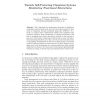Free Online Productivity Tools
i2Speak
i2Symbol
i2OCR
iTex2Img
iWeb2Print
iWeb2Shot
i2Type
iPdf2Split
iPdf2Merge
i2Bopomofo
i2Arabic
i2Style
i2Image
i2PDF
iLatex2Rtf
Sci2ools
104
click to vote
PUC
2006
2006
Towards self-protecting ubiquitous systems: monitoring trust-based interactions
The requirement for spontaneous interaction in ubiquitous computing creates security issues over and above those present in other areas of computing, deeming traditional approaches ineffective. As a result, to support secure collaborations entities must implement selfprotective measures. Trust management is a solution well suited to this task as reasoning about future interactions is based on the outcome of past ones. This requires monitoring of interactions as they take place. Such monitoring also allows us to take corrective action when interactions are proceeding unsatisfactorily. In this vein, we first present a trust-based model of interaction based on event structures. We then describe our ongoing work in the development of a monitor architecture which enables self-protective actions to be carried out at critical points during principal interaction. Finally, we discuss some potential directions for future work.
| Added | 14 Dec 2010 |
| Updated | 14 Dec 2010 |
| Type | Journal |
| Year | 2006 |
| Where | PUC |
| Authors | Colin English, Sotirios Terzis, Paddy Nixon |
Comments (0)

